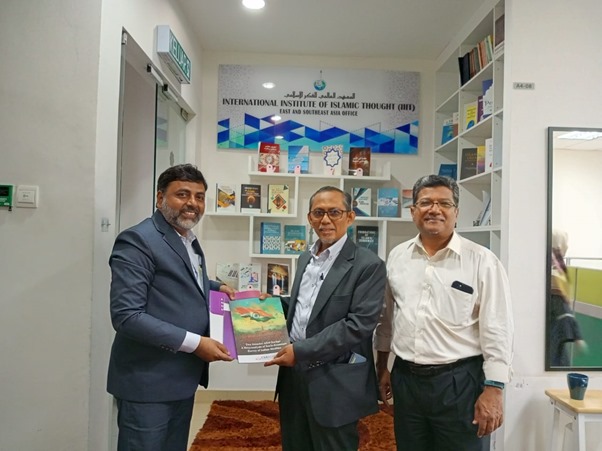NEW DELHI :

Prof Rizwan Khan, Director of CSR (left) presents works of CSR to Prof Fauzan, as Prof Aslam Haneef (Deputy Rector IIUM Malaysia) looks on.
New Delhi :
At the prestigious International Islamic University Malaysia (IIUM), Prof. Mohammed Rizwan, director of New Delhi’s Centre for Study and Research (CSR), called for the establishment of non-Eurocentric think tanks across the Muslim world, particularly in India, emphasizing the integration of divine knowledge (Wahi) and human reasoning (‘Aql) to address current civilizational challenges and develop groundbreaking paradigms aligned with the objectives of Islamic law (Maqasid al-Sharia).
Prof. Rizwan, recently concluded a week-long academic tour in Malaysia, where he engaged with prominent academicians, institutional heads, and high-ranking officials from renowned universities and institutions.
Highlighting his visit were series of lectures, key pivotal discussions aimed at fostering collaboration between CSR and Malaysian institutions to strengthen Islamic intellectual thought and reshape the role of think tanks in the Muslim world.
In a conversation with Indiatomorrow.net, Prof. Rizwan shared insights into his strategically planned academic tour in Malaysia. He revealed that institutions and universities aligned with CSR’s vision were carefully shortlisted, and appointments were secured with Directors, Deans, and administrative heads to maximize the tour’s impact and mutual collaboration.
Prof. Rizwan explained that the primary aim of his visit was to introduce CSR and explore collaborative opportunities with Malaysia’s prestigious institutions. The focus centred on initiating partnerships in four key domains: Researcher Exchange Programmes, Collaborative Academic Events, Joint Research Publications, and Joint Book Publications under the BIT (IIUM’s official publishers).
His itinerary included both formal and informal engagements with institutional heads, staff members, academicians, researchers, and master’s students. Discussions focused on aligning mutual goals and paving the way for future collaborations.
Providing further details, Prof. Rizwan stated that he visited a total of seven institutes, three universities, and five departments, meeting with 14 academicians. The tour resulted in the signing of four Memorandums of Understanding (MoUs) with various institutions, marking a significant step toward fostering global academic partnerships.
In a thought-provoking lecture at the International Islamic University Malaysia (IIUM), the CSR Director highlighted the civilizational challenges faced by Muslims globally while redefining the concept of think tanks through an Islamic lens.
Prof. Rizwan presented a non-Eurocentric, holistic perspective, stating: “A think tank is a collective intellectual entity dedicated to addressing contemporary and civilizational challenges, including policy issues, using revealed knowledge (Wahi) as a springboard to evolve novel paradigms through human reason (‘Aql) to fulfill the broader objectives of Islamic law (Maqasid al-Sharia).”
He emphasized that this distinct approach integrates spiritual transcendence into the very purpose of Islamic think tanks, a dimension he noted is conspicuously absent in Eurocentric frameworks, offering a transformative vision for intellectual endeavours in the Muslim world.
Dr. Rizwan emphasized the urgent need for think tanks to address the socio-political marginalization of Indian Muslims, highlighting their critical role in shaping policy advocacy, countering misrepresentation with data-driven narratives, and celebrating the historical and cultural contributions of the community. “Think tanks are not just about documenting challenges but also about showcasing the immense contributions of Indian Muslims to the nation’s history and culture,” he remarked.
Dr. Rizwan laid out a clear and strategic roadmap for creating impactful Islamic think tanks, including 1) Defining Vision and Mission: Establishing inclusive goals that address diverse societal challenges. 2) Operational Structure: Forming interdisciplinary research teams and building partnerships with universities, NGOs, and policymakers. 3) Sustainable Financing: Leveraging endowments, grants, and Islamic financial tools like waqf to secure financial independence.
He acknowledged significant challenges, such as securing sustainable funding, attracting skilled professionals, and managing ideological diversity within the Muslim community. To overcome these hurdles, he advocated for long-term planning, innovative solutions, and a unified effort to ensure the success of such initiatives.
The CSR director underscored the transformative potential of think tanks in reviving the intellectual heritage of Islamic civilization, advocating for a focus on key areas such as socio-economic justice, ethical technology, and the evolving identities of Muslims in a globalized world.
The session concluded with a dynamic discussion. Dr. Sayyed Mohamed Muhsin from the Department of Fiqh and Usul al-Fiqh proposed enhancing the definition of think tanks by incorporating a “futuristic” element, emphasizing the need for forward-thinking strategies that creatively shape the future.
Prof. Mumtaz Ali highlighted the pivotal role of publications and literature in nation-building and challenging dominant narratives.
Offering a visionary roadmap for establishing think tanks that seamlessly integrate Islamic principles with contemporary policy frameworks, Dr. Rizwan presented a bold approach to addressing civilizational challenges in India and beyond.
source: http://www.indiatomorrow.net / India Tomorrow / Home> Education / by Anwarulhaq Baig / December 09th, 2024








